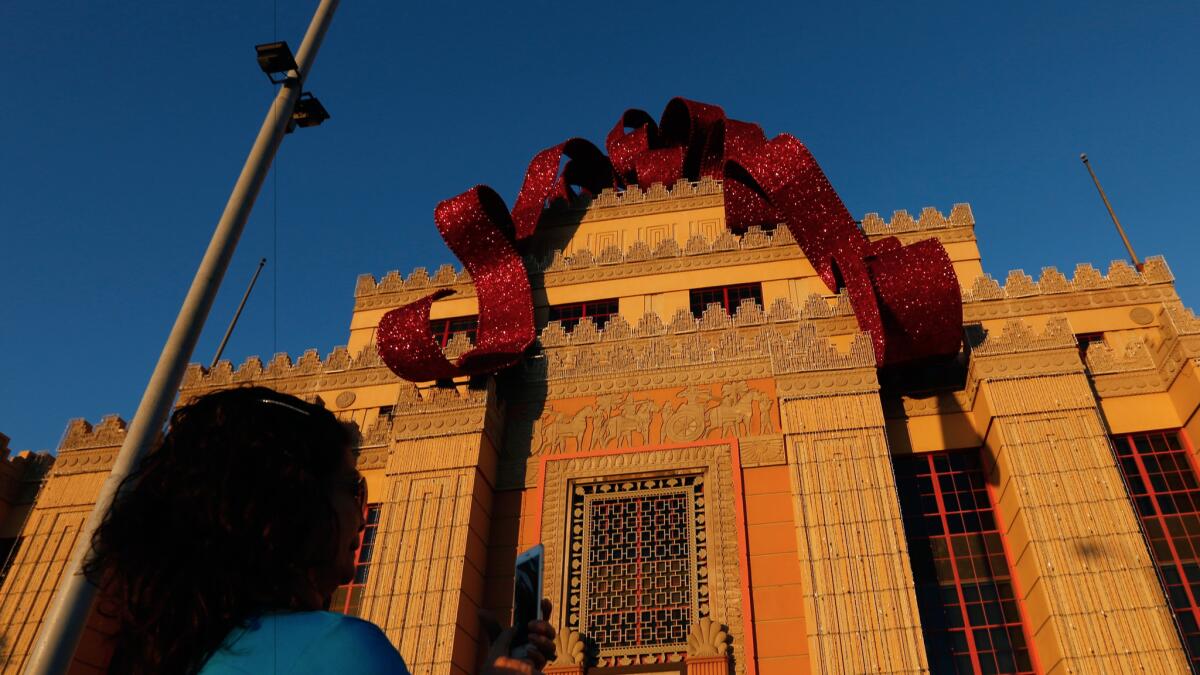Column: We know Christmas comes earlier every year, but this is ridiculous

- Share via
As surely as the crocus heralds the arrival of spring, we motorists on the Santa Ana Freeway long have marked the onset of Christmas season by the appearance of an enormous red bow draped atop the Citadel Outlets mall, not far from downtown Los Angeles.
So I had to consult my calendar when, driving past the Citadel’s crenellated mock-Assyrian walls the other day, I found the self-proclaimed “world’s biggest bow” already in place. Month of October, check. Halloween still two weeks off, check. Outdoor temperature, 80 degrees — well, climate change, you know. But Christmas? I don’t think so.
That’s not to say there isn’t something festive about the Citadel’s decor, which includes 75-foot ribbons cascading down the front of the building, as well as a giant stuffed reindeer perched on oversized tree ornaments.
We know it seems early.
— Citadel Outlets spokeswoman Chelsea Hartnett, on the pre-Halloween installation of the mall’s Christmas decorations
Yet while Christmas season seems to creep earlier into our lives every year, at least Halloween used to mark the informal early limit of Christmas cheer. The Citadel seems to be blowing right through those unspoken rules.
“We know it seems early,” Chelsea Hartnett, the mall’s spokeswoman, acknowledged in an email. But she said the mall is “on track with the same decoration schedule we’ve employed for the past few years.” The one deadline the installation needs to meet, she told me, is Nov. 5, the date of this year’s tree-lighting concert around the mall’s “world’s tallest live-cut tree,” a 115-foot behemoth arriving at the mall Tuesday.
Notwithstanding Hartnett’s argument that the early evocation of Christmas cheer is something of a tradition at the Citadel, Christmas creep is a widely noted phenomenon that doesn’t elicit widespread joy. It’s a perplexing phenomenon of modern times that just when ordinary people are feeling more harried and overscheduled in their personal lives, our communal events are becoming ridiculously prolonged.
The 2016 presidential campaign, for instance, feels as if it’s been going on since sometime in the late nineteenth century. Presidents Day sales now seem to last until the Fourth of July, and Fourth of July sales until, well, Christmas.
The post-Thanksgiving Black Friday shopping melee, itself a made-up event, metastasized first into the following weekend, then to the following Monday (“Cyber Monday,” don’t you know) and then pre-infected Thanksgiving itself. It was heartening last year when a few big retailers called a halt to Thanksgiving Day sales ostensibly out of solicitude for their workers, but the revolt was on a limited scale; at the Citadel, as it happens, 130 stores will be open on Thanksgiving this year starting at 8 p.m., which won’t give their employees much time to digest Thanksgiving dinner.
The consequence of this trend is that some of our most revered holidays shed their roles as markers of the turning of the year and the change of seasons. Some didn’t have much significance beyond the occasion for annual white sales, but others were unique — especially Yuletide, which loses its secular meaning as it bloats up from a week or so in late December to a full quarter of the year.
Obviously, the driver of much of this bloat is commerce. Merchants, believing that the spirit of Christmas provokes people to unbelt a little bit more than they do during the drab, utilitarian buying days of the rest of the year, appreciate the chance to bathe more weeks of the year in a yuletide glow.
Whether that actually produces a net increase in overall sales is doubtful, since late-December purchases may just be spread over a longer period. The trend may even reduce sales, if the impulse to spend a few bucks more on a Christmas gift disappears for a purchase made in October.
From time to time, the argument is heard that holiday buying starts early because Hanukkah, the Jewish winter holiday, comes early that year. According to the Jewish calendar, the eight-day celebration can start as early as Nov. 28 or as late as Dec. 27. But the argument won’t work this year, as Hanukkah starts on Dec. 24.
There also may be a zero-sum calculation at work: if Christmas buying really does start before Halloween — and the National Retail Federation says that’s true for 40% of holiday shoppers, with only 19% waiting until December — then it pays to roll out your holiday promotions before your competitor. The housewares chain Lowe’s already is selling artificial Christmas trees and trimmings, although sales of fresh-cut varieties won’t begin until Nov. 23 (the day before Thanksgiving).
It’s proper to note that complaints about Christmas creep are about as old as complaints about the insipidness of Christmas pop music. A few years ago, Paul Collins of Slate found an October Christmas ad in a newspaper from 1912. Grousing about the incursion of early Christmas soon followed. So it may be that pre-Halloween Christmas is here to stay, and almost certain to grow. If you want to get a jump on your 2017 Christmas shopping, you might as well start on Dec. 26.
Keep up to date with Michael Hiltzik. Follow @hiltzikm on Twitter, see his Facebook page, or email [email protected].
Return to Michael Hiltzik’s blog.
More to Read
Sign up for The Wild
We’ll help you find the best places to hike, bike and run, as well as the perfect silent spots for meditation and yoga.
You may occasionally receive promotional content from the Los Angeles Times.







